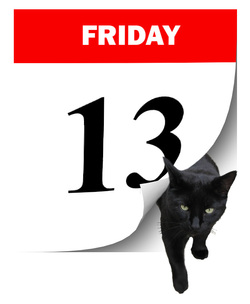
For a superstition, the fear of Friday the 13th seems fairly new, dating back to the late 1800s. Friday has long been considered an unlucky day (according to Christian tradition, Jesus died on a Friday), and 13 has a long history as an unlucky number.
Many people may fall prey to the human mind's desire to associate thoughts and symbols with events.
If anything bad happens to you on Friday the 13th, the two will be forever associated in your mind; all those uneventful days in which the 13th fell on a Friday will be ignored.
The association may also be biblical. The Last Supper's 13th guest was Judas, who betrayed Jesus. His crucifixion was the next day, a Friday.
In reality, the Friday the 13th superstition is a relatively modern phenomenon indeed. Less than 100 years ago, the number 13 did not have this sinister meaning. But its manifestations can be seen in a number of areas: High-rise buildings and hotels often skip the 13th floor, and hospitals often do not have a Room 13. Some airports and airlines skip a gate 13 or row 13, respectively.
Thinking over about superstitions can be intriguing and also illuminating. Often history is made of details, of apparently irrelevant little things.
Maybe I'll come back to this topic, which deserved more attention and space.
What is superstition after all? Some call "superstitions" the beliefs of others. But here we are approaching a very delicate subject rich of nuances.
A belief which leaves no place for doubt is not a belief; it is a superstition.
Bertrand Russell said: “Fear is the main source of superstition, and one of the main sources of cruelty. To conquer fear is the beginning of wisdom.”

 RSS Feed
RSS Feed


